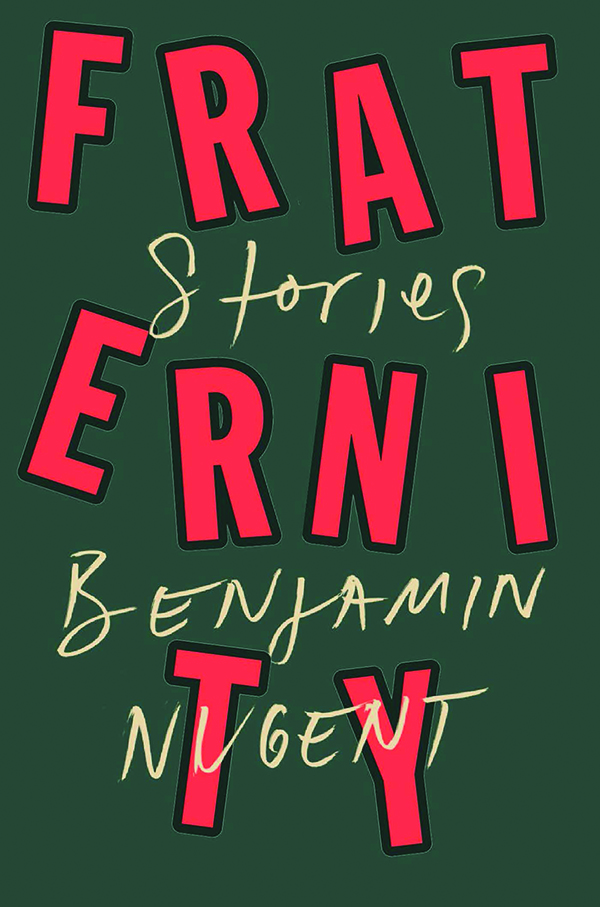I’ll start by confessing that I was never in a fraternity. In the Canadian province where I attended college, frats existed but, for a variety of historical and cultural reasons, did not hold the sway they do on some U.S. campuses. Yet young adults, especially young men, invariably create spaces for tribal communion. I knew some students who lived in a massive, dilapidated mansion filled with strange wonders such as disco balls and secret sliding bookcases. The mansion was co-ed, but the driving ethos was unmistakably male. Once, when a U.S. lacrosse team visited the town, the house hosted a lavish Viking dinner, complete with a long table, chalices of wine, and roasted lamb, plus a rule that the feast be consumed without utensils. They cooked the lamb whole except for the head, almost burning down the house in the process. When I opened the kitchen freezer looking for ice, the lamb’s gaping, frozen head fell on my hand. I was thrilled to be there.
The writer Benjamin Nugent seems to share a fascination with these spaces. His new book, Fraternity: Stories, is a collection of short stories set in and around a fraternity in a New England college town. The stories are told from different points of view, with some overlapping characters, but the real protagonist, the centrifuge, is the fraternity itself. The narrator of one story argues, “When the right guys are running a fraternity, it’s a place where people will tell you if you’re being an asshole. … It’s like having twenty older brothers who’re there to help you grow up. But if the wrong guys are running a fraternity it’s more like a barbarian tribe, where all that matters is whether you’re in it or not.”

In his interest in masculinity, especially its unspoken or uninterrogated aspects, Nugent reminds me of the writer Teddy Wayne, whose recent novel Apartment examined the tension between two male aspiring writers who share an apartment. Nugent’s project is more sociological. In an interview with Esquire, he describes his fascination with frats in the vocabulary of an anthropologist or a woke Tom Wolfe: “I [am] interested in the way that these guys would never talk about certain things,” he said. “I’m intrigued by places where nothing is processed.”
The eight stories in this collection vary in their perspective and style: Some are written in first person, others in third, some in present tense, others in past; some are funny, others are sad, and probably most of them could be described as both. The superb first story, “God,” concerns a female student who sleeps with the frat’s widely admired president, Caleb. She writes a poem about Caleb’s embarrassing sexual performance, and her bravura is received with awe and respect by Caleb and his frat brothers. The narrator is a brother obsessed with God’s poem for, we realize, very different reasons from the others.
In his Esquire interview, Nugent explains: “Delta Zeta Chi is a place where no one is explicitly homophobic — that wouldn’t be cool — but there is an understanding that if you were gay, you would be excluded from some of the intimacies of brotherhood, because the intimacy presumes a lack of sexual tension.” Nugent also probes the perennial problem of sexual consent. One story, “Basics,” is about a sexually inexperienced frat brother who accidentally crosses a line during a hookup. In “The Treasurer,” a brother is forced to perform a public sex act as part of a hazing ritual; a woman also participates, but the story suggests that the one who was truly violated is him.
A word here on prose: Nugent has said that he prefers that “form cut against content,” meaning that the more unsophisticated or vulgar or even ugly the subject matter, the more elevated the writing. The writing in these stories more than fulfills that aesthetic promise; Nugent’s slightly lyrical style throws his subjects into beautiful and sometimes surreal relief. He describes someone watching his frat brothers play a video game:
Nugent has a flair for word choice, particularly martial or mock-heroic language that lends itself so well to the narrative diction of jockish but not unintelligent young men: A girlfriend is “strafing” her hair with a blow-dryer; a guy is admired as “a war elephant on the lacrosse field.” The brothers’ simultaneous expressiveness and lack of self-awareness can be very funny. On the subject of nicknames, one narrator earnestly explains: “What people often failed to realize about Delta Zeta Chi was that we were like Native Americans, in that our names related to aspects of our personalities.”
A unifying theme of these affecting, funny, sometimes melancholic, and empathetic stories is connection and belonging. If not the tribal membership of a frat, the characters are looking for validation in a relationship or a tryst or a friend or an ex-girlfriend. As a kind of ethnographer, Nugent’s area of intellectual investigation is masculinity and male young adulthood; at heart, however, the stories in Fraternity: Stories are really just exploring the same human themes that the best novelists and short-story writers always have.
J. Oliver Conroy’s writing has been published in the Guardian, New York magazine, the Spectator, the New Criterion, and other publications.
